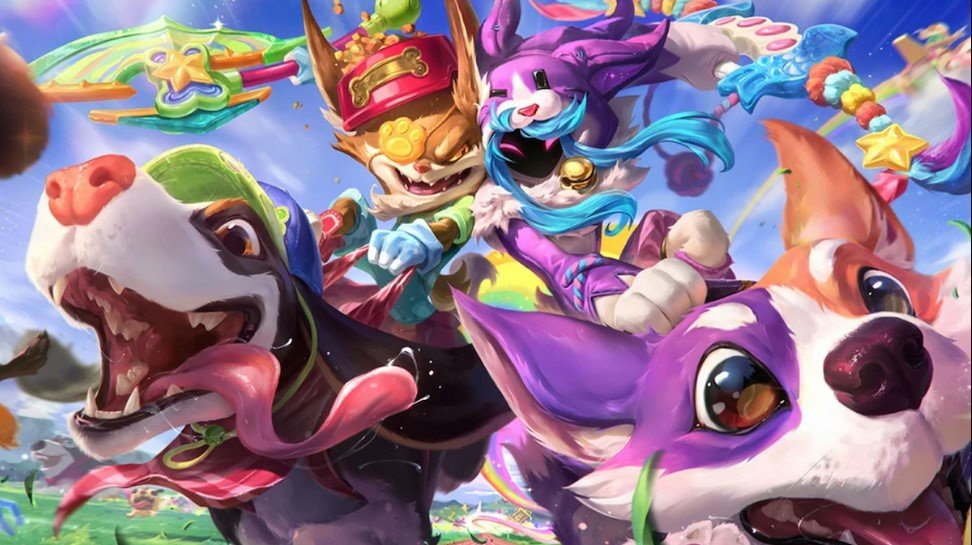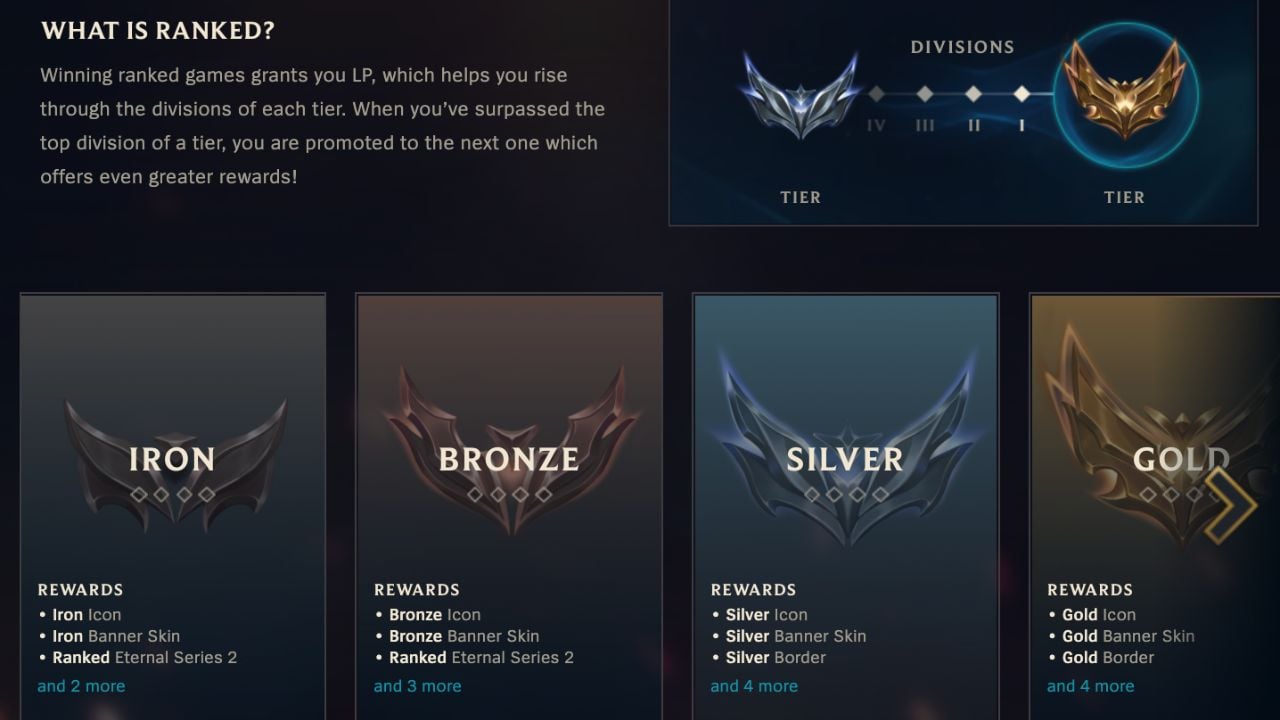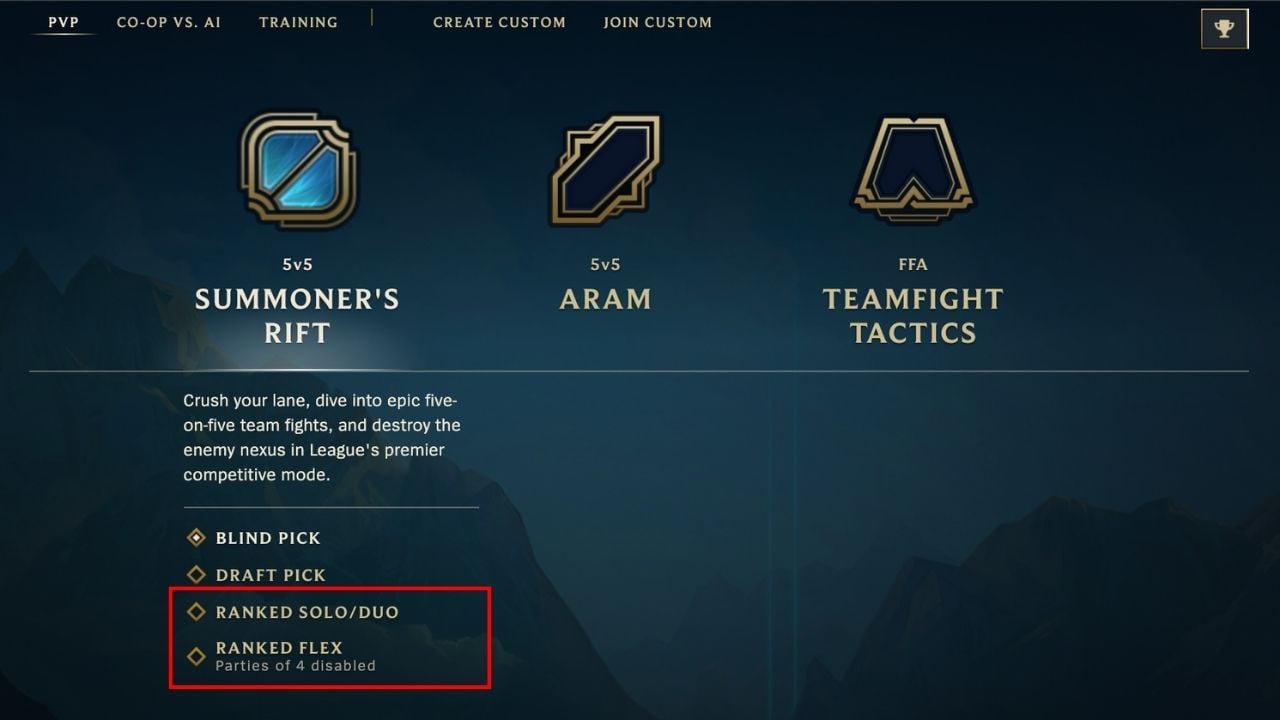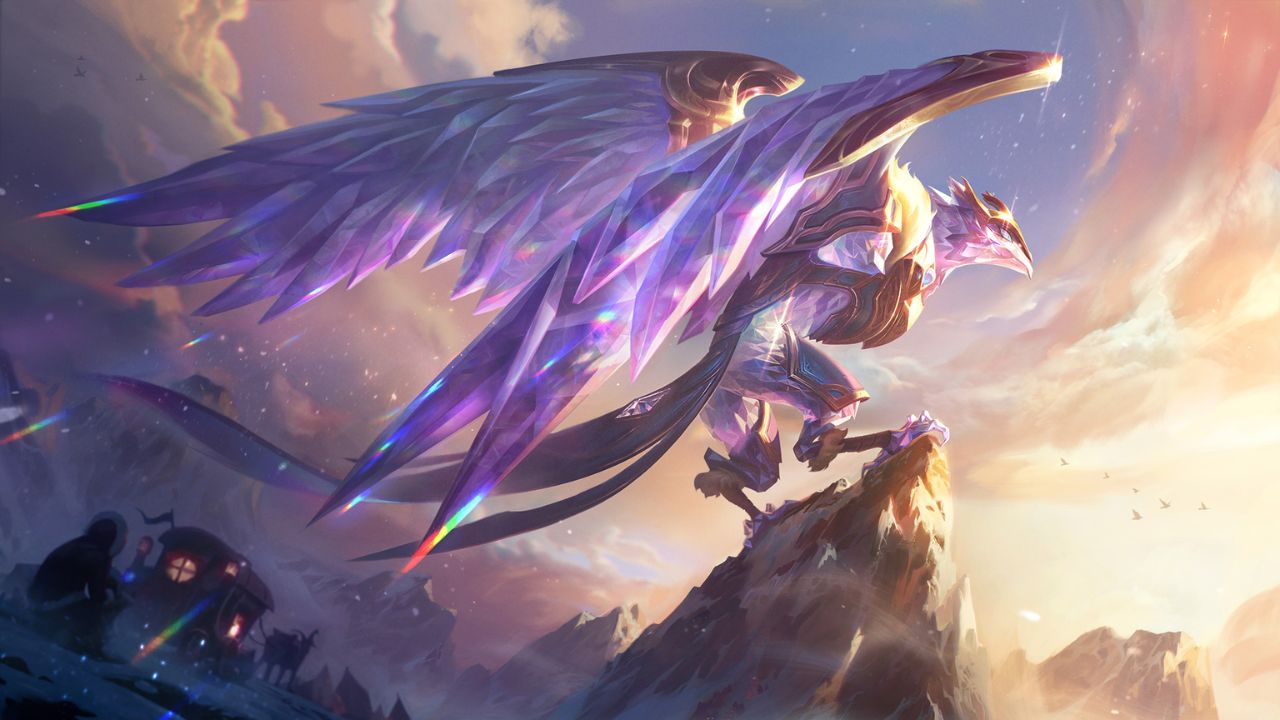The ultimate guide to LoL’s ranking system

Many League of Legends players look toward competitive ranked play as the focal point of the game. Ranked queues are the heart and soul of League and have constantly been at the game’s forefront regarding how the MOBA is balanced and how the player base perceives it.
Each season, for about 11 months out of the year, League players grind tirelessly toward the apex of the ranked ladder. With nine ranks to surpass, the ultimate goal of reaching the Challenger tier and cementing your place among the best of the best is a possibility for everyone who plays League.
Whether you’re striving for end-of-season rewards, grinding upwards for ranked glory, or simply playing for the love of the game, there are a few things you should know about League’s ranked and ranking system.
Contents
- League of Legends ranks and ranking system, explained
- League of Legends ranked tiers, divisions, and LP explained
- What is demotion and decay in League?
- Seasons in League of Legends
League of Legends ranks and ranking system, explained
What is ranked play in League?

Ranked play, or ranked games, is a mode in League where players battle on the Rift to destroy the enemy team’s Nexus, win the game, and rise through League’s ranked ladder—which is why it’s called ranked.
This ranked play is as competitive as it gets for League players. Ranked games remain the same as normal games, but the stakes are higher. Players place their ranks on the line each game, so participants tend to take games more seriously.
Ranked games only take place on Summoner’s Rift, and there is no ranked option for ARAM at this time—even though I wish there were. Riot did introduce a new game mode in 2023 called Arena, where you can play ranked games in a 2v2v2v2 format. However, this game mode isn’t permanent.
How do I unlock ranked games in League?
To unlock or start playing ranked games in League, you must be level 30 and own at least 20 champions. If you’re new to League, you can purchase champions for Blue Essence, which can be earned simply by playing the game, so you don’t have to spend real-world money to buy them.
Once you’re ready to begin your ranked climb, there are two things you’ll need to consider—whether you want to play solo/duo or ranked flex and then focus on getting your initial rank through placement games.
Should I play ranked solo/duo or ranked flex?

Ranked League has two major options when it comes to game modes:
- Ranked solo/duo.
- Ranked flex.
Ranked solo/duo, as the name implies, allows for parties of one or two players to queue up at a time. This version of ranked play is the most popular option for most League players. Parties bigger than two players can’t queue up for ranked solo/duo games. This is the game option to choose if you’re playing solo or with a friend.
Parties of three or five players can instead queue up for ranked flex queue, which allows for any-sized parties to play together, except for parties of four. Riot Games’ philosophy on parties of four excludes them from playing to prevent one player on a given team from being singled out. If you’ve got a dedicated League squad, play ranked flex.
What are placement games? How to get your first rank
You’ll need to play five placement games to get your first initial rank in League. This process is repeated when ranks are reset at the beginning of every season. Ranked seasons will reset at the beginning of every split, with the first reset happening at the beginning of the year in January, and the second one will start in the middle of the year.
Generally, players will end up in Bronze and Silver following their placements. But undefeated players in their placements could end up in Gold.
All ranks in League of Legends
There are 10 ranks in League. You can find them listed below in descending order.
- Challenger
- Grandmaster
- Master
- Diamond
- Emerald—this is the newest rank that was introduced in split two of 2023
- Platinum
- Gold
- Silver
- Bronze
- Iron
League of Legends ranked tiers, divisions, and LP explained
How tiers and divisions work in ranked League of Legends

From Iron to Diamond, each rank has four divisions to progress through before reaching the next rank. Divisions are progressed up until the lowest number is reached.
For example, a player must progress from Gold IV to Gold I before ranking up to Platinum and starting the process again at Platinum IV.
You’ll reach a new division whenever you hit 100 League Points (LP) while climbing through that division. Upon reaching 100 LP in division one, you’ll automatically move to the next division.
In the past, you would be placed into a promotional series, but Riot has removed these promotional games, so you’ll automatically move up, so long as you have the required LP. But these divisions do not separate Challenger, Grandmaster, and Master ranks.
How the ranking system works in Master, Grandmaster, and Challenger
In the Master, Grandmaster, and Challenger ranks, there are no divisions. Instead, you’ll be placed on a ranked ladder, which is updated every day, and depending on your current LP standings, you’ll be placed in the appropriate tier.
You’ll continue to earn LP in your Master, Grandmaster, and Challenger games, but these LP gains will only define your position on the ladder and therefore determine your rank. To get to Master, you must win your Diamond promos and reach 100 LP in this tier.
For Grandmaster, you’ll need to reach 200 LP and gain more LP than the lowest Grandmaster player in your region. Finally, the Challenger tier starts at roughly 500 LP, but you’ll need, similar to players in Grandmaster, to outshine the lowest-ranked Challenger player in your region.
How is your LP determined?
Your LP is determined by an internal system known as MMR (Matchmaking Rating). Your MMR is invisible and works only behind the scenes. There is no physical way of seeing your MMR since it is only a guide used to place you in games alongside players of a similar rating.
The more games you win, the higher your MMR will be, increasing the amount of LP you gain after each victory. This discrepancy between MMR and LP is hard to track, considering your MMR is hidden, and there’s no way to check it.
But if you are gaining a lot of LP per game, it might suggest that your MMR is higher than most other players in your current rank. Because you’re gaining LP rapidly, Riot’s internal systems reward you by giving you a fast track out of your current rank.
If you’re losing more LP than you’re gaining, your MMR is probably lower than most other players at your current rank, and the game’s systems are trying to slow down your climb to figure out where you truly belong on the ranked ladder.
What happens if you dodge ranked games?
Dodging ranked games will result in a loss of LP, which you should avoid unless absolutely necessary. If someone else on your team dodges or rage quits a game, you’re less likely to be penalized as heavily. However, you will still be penalized.
You’ll lose three LP and have a six-minute queue penalty for dodging your first game. When you dodge a game for the second time in 24 hours, you’ll lose 10 LP and have to wait at least 30 minutes before queuing up for your next ranked game. If you wait out the dodge timer penalty, queue once again, and dodge the game, you won’t be able to play League for the next 12 hours, and you’ll lose 10 LP.
Besides that, declining or missing the Ready Check too many times in a row might result in you getting a penalty. If you continue to do so, your penalty might increase to 10 LP loss and, eventually, an extended ranked queue ban.
What is demotion and decay in League?
You risk being demoted if you go on a losing streak in ranked League. This occurs when you lose after hitting zero LP in a given division. While you sometimes might have a “grace game” or two, you’ll often be thrust downwards into the next-lowest division and forced to climb back up.
High-Elo League players must play at least one ranked game per day. Accounts placed in Master, Grandmaster, and Challenger are prone to LP decays, meaning if they don’t play the game, they will lose 75 LP.
Seasons in League of Legends
Until season 2023, ranked in League had splits that divided the regular season into three equally long splits. Starting with 2023, ranked will have only two splits, with each split handsomely rewarding players for playing with chests, keys, random emotes, and ultimately, Victorious skins no matter your rank.
The first split started on Jan. 11 and will last until the beginning of the next split, split two. Split two is scheduled for the middle of the year.
End-of-season ranked rewards
Riot rewards League players at the end of each season with rewards based on their rank. Your rewards are determined based on your rank at the end of the season, not your highest rank during the season.
Initially, only players ranked Gold and higher would receive the season’s Victorious skin (with appropriate chromas colorized based on rank). But, starting season 2023, players of all ranks can get their hands on Victorious skins as they play League.
To get the Victorious skins, all you have to do is play the game and complete all the milestones under the Ranked tab in your client. You’ll earn Hextech chests, keys, and emotes along the way. Victorious skins are usually selected and designated for the most popular champion of that season. In 2022, the Victorious skin was given to Sejuani.
In 2023, League had two ranked seasons, starting at the beginning of the year in January and the other in the middle of the year. The first ranked season had a hard reset, and the second season had a soft reset, but both seasons featured a Victorious skin you could earn after completing all the milestones.
Although there is a lot that you need to know when playing League, this is everything you need to know about ranked matches and how they work in League of Legends. If you want to dive deeper, you can check out the complete breakdown of Legendary skins in League of Legends.

Sponsored by Egroup88









